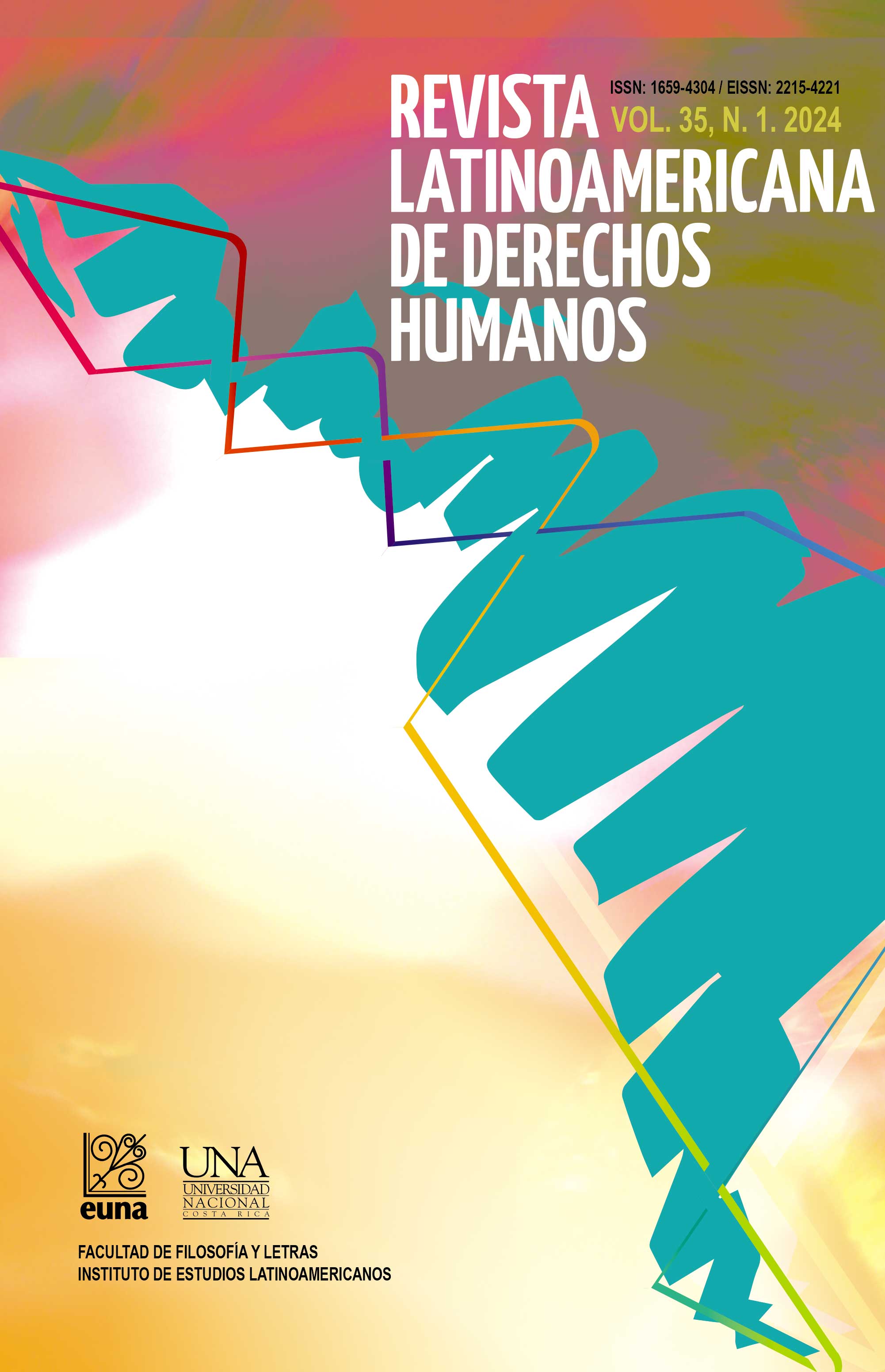Some Issues Presented by the Legal Claim for Historical Injustices. The Conquest of the Desert Case
DOI:
https://doi.org/10.15359/rldh.35-1.6Keywords:
Conquest of the Desert, genocide, compensation, reparation, historical injustice, intergenerational justiceAbstract
The so-called 'Conquest of the Desert' was a series of military campaigns that occurred in the current Argentine Patagonian territory between 1878 and 1885. These campaigns resulted in the murder, rape, and enslavement of numerous indigenous peoples and communities. This was not an isolated case. It rather adds to a series of systematic attacks that indigenous people have endured in Argentina. In recent years, as a result of the demands and struggles of indigenous peoples and communities, as well as human rights organizations, some of these events have started to be brought to trial. In particular, the Napalpí Massacre (1924) and La Bomba Massacre (1947) were the first incidents to receive favorable judicial responses. In both cases, it was determined that the State's actions constituted genocide and, therefore, reparations should be provided to the current communities. However, the Conquest of the Desert, nowadays, remains unanswered by the State. Considering this scenario, this paper aims to reconstruct the multiple issues that the potential legal claim may face. To accomplish this, we will start by explaining what the Conquest of the Desert entailed. Next, we will explain the concept of genocide as applied to historical injustices. As a third step, we will reconstruct the jurisprudential cases that have addressed indigenous genocides that have occurred in the past. With this revealed scenario, we will address the various legal and political issues that arise in claims for justice.
References
Bandieri, S. (2000) “Ampliando las fronteras: la ocupación de la Patagonia”. En Lobato, M. (dir.) Nueva historia argentina: el progreso, la modernización y sus límites (1880-1916). Sudamericana. Pp.119-177.
Cámara Federal de Resistencia. (14 de septiembre de 2020).“Asociación Comunitaria ‘La Matanza’ c/ Estado Nacional - Poder Ejecutivo s/Daños Y Perjuicios”, Resistencia, Chaco.
Corte Interamericana de Derechos Humanos. (29 de noviembre de 2018) “Órdenes Guerra y otros Vs. Chile”, San José, Costa Rica.
Corte Suprema de Justicia de la Nación “Arancibia Clavel, Enrique Lautaro s/ homicidio y asociación ilícita”, Ciudad Autónoma de Buenos Aires, 8 de marzo de 2005.
Corte Suprema de Justicia de la Nación. (14 de junio de 2005).“Simón, Julio Héctor y otros s/ privación ilegítima de la libertad, etc.”, Ciudad Autónoma de Buenos Aires.
Corte Suprema de Justicia de la Nación (30 de octubre de 2007).“Larrabeiti Yañez, Anatole Alejandro y otro c/ Estado Nacional s/ proceso de conocimiento”, Ciudad Autónoma de Buenos Aires.
Corte Suprema de Justicia de la Nación. (28 de mayo de 2017) “Villamil, Amelia Ana c/ Estado Nacional s/ Daños y perjuicios”, Ciudad Autónoma de Buenos Aires.
Curruhuinca, C. y Roux. (1993) L. Las matanzas del Neuquén. Crónicas mapuches. Plus Ultra.
Delrio, W. (2015). “El sometimiento de los pueblos originarios y los debates historiográficos en torno a la guerra, el genocidio y las políticas de estado”. Aletheia, 5 (10), 1-15.
Delrio, W. (2019). “Tres preguntas sobre guerra y genocidio”, Memoria Americana. Cuadernos de Etnohistoria, 27 (2), 52-79. https://doi.org/10.34096/mace.v27i2.7365
Delrio, W.; Lenton, D.; Musante, M.; Nagy, M.; Papazian, A. y Pérez, P. (2010) “Discussing Indigenous Genocide in Argentina: Past, Present, and Consequences of Argentinean State Policies toward Native Peoples”. Genocide Studies and Prevention: An International Journal, 5 (2), 138-159. https://doi.org/10.3138/gsp.5.2.138
Duff, R. A. (2001). Punishment, communication, and community. Oxford University Press.
Dussel, E. (1994) 1492: el encubrimiento del otro: hacia el origen del “mito de la Modernidad”. UMSA. Facultad de Humanidades y Ciencias de la Educación, y Plural Editores.
Dussel, E. (1996). Filosofía de la Liberación. Nueva América.
Dussel, E. (2000) “Europa, modernidad y eurocentrismo”. En Lander, E. (ed.) La colonialidad del saber: eurocentrismo y ciencias sociales. Perspectivas latinoamericanas. CLACSO: 24-33
Dworkin, R. (1978). Taking Right Seriously. Harvard University Press:
Dworkin, R. A. (1985). Matter of Principle. Harvard University Press. https://doi.org/10.2307/j.ctv1pncpxk
Dworkin, R. (2004) “Hart’s Postscript and the Character of Political Philosophy”. Oxford Journal of Legal Studies, 24 (1),1-37. https://doi.org/10.1093/ojls/24.1.1
Dworkin, R.. (2011). Justice for hedgehogs. Harvard University Press. https://doi.org/10.4159/9780674059337
Juzgado Federal de Resistencia N° 1 “Federación de Comunidades Indígenas del Pueblo Pilagá c/ PEN s/ Daños y perjuicios”, Resistencia, Chaco, 4 de julio de 2019.
Juzgado Federal de Resistencia N° 1 “Masacre de Napalpí s/ Juicio por la Verdad”, Resistencia, Chaco, 30 de junio de 2022.
Kant, I. (2010). Contestación a la pregunta ¿Qué es la Ilustración? Gredos. https://doi.org/10.22201/dgpfe.9786070215346e.2010
Kant, I. (1981). La religión dentro de los límites de la mera razón. Alianza.
Lenton, D. (2018)“De genocidio en genocidio. Notas sobre el registro de la represión a la militancia indígena”. Revista de Estudios sobre Genocidio, 13, 47-61.
Meyer, L. (2001). “Transnational Autonomy: Responding to Historical Injustice in the Case of the Saami and Roma Peoples”. International Journal on Minority and Group Rights, 8 (2/3), 263-301. https://doi.org/10.1163/15718110120908420
Martínez Sarasola, C. (1998). Los hijos de la tierra. Historia de los indígenas argentinos. Emecé.
Martínez Sarasola, C.(2011) Nuestros paisanos los indios. Del nuevo extremo.
Nino, C. (2015). Juicio al mal absoluto ¿hasta dónde debe llegar la justicia retroactiva en casos de violaciones masivas de los derechos humanos? Siglo XXI.
Pérez, P. (2011) “Historia y silencio: La Conquista del Desierto como genocidio no-narrado”. Corpus, 1 (2), 1-9. https://doi.org/10.4000/corpusarchivos.1157
Pérez, P. (2019). “La Conquista del desierto y los estudios sobre genocidio. Recorridos, preguntas y debates”. Memoria Americana. Cuadernos de Etnohistoria, 27 (2), 34-51. https://doi.org/10.34096/mace.v27i2.7364
Silva Sánchez, J. M. (2018) Malum passionis. Mitigar el dolor del Derecho Penal. Atelier Libros Jurídicos.
Truccone, S. (2022). “Responding to historical injustices: Collective inheritance and the moral irrelevance of group identity”. European Journal of Political Theory, 0 (0), 1-20. https://doi.org/10.1177/14748851221100094
Waldron, J. (1992) “Superseding historic injustice”. Ethics, 103 (1), 4-28. https://doi.org/10.1086/293468
Waldron, J. (2002). “Redressing historic injustice”. University of Toronto Law Journal, 52 (1), 135-160. https://doi.org/10.2307/825930
Waldron, J. (2004). “Settlement, return, and the supersession thesis”. Theoretical Inquiries in Law, 5 (2): 237-268. https://doi.org/10.2202/1565-3404.1093
Wallerstein. (2007). I. Universalismo europeo. El discurso del poder. Siglo XXI.
Zaffaroni, E. (2022) Colonialismo y Derechos Humanos. Apuntes para una historia criminal del mundo. Taurus.
Downloads
Published
How to Cite
Issue
Section
License
El material que se publica en esta Revista está bajo una licencia “Creative Commons” 3.0 Costa Rica (CC, Reconocimiento-NoComercial-SinObraDerivada 3.0 Costa Rica (CC BY-NC-ND 3.0 CR) . Esto significa que el material publicado en la revista se puede compartir (copiar y distribuir) en cualquier medio o formato considerando que se debe reconocer de forma adecuada la autoría del material y la fuente, no puede utilizarse con fines comerciales y no se aceptan las obras derivadas (remezclar, transformar o crear a partir del material).








